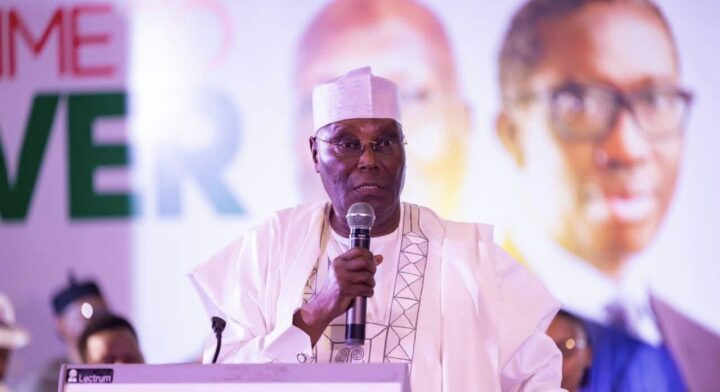Atiku Abubakar, forma vice-president and presidential flagbearer of di Peoples Democratic Party (PDP), make plenti claim ontop di economy head as im dey tok for di presidential dialogue program wey Nigerian Economic Summit Group (NESG) orgaise.
We cari eye luk some of im claim and na wetin we find be dis.
CLAIM 1: “More dan 23 million Nigerians no get work”
FINAL TOK: Na true.
According to di most recent informate wey di National Bureau of Statistics (NBS) comot for di fourth quarter of 2020, di amount of pipu wey no get work tanda from 27.1 per cent go 33.3 per cent.
Di report show sey more dan 23.1 million Nigerians out of all di 69.6 million pipu wey fit work bin no get job for di last quarter of 2020.
CLAIM 2: “In just 5 years, between 2015 and 2020, di nomba of pipu wey get full time work drop by 54 per cent, from 68 million go 31 million pipu.”
FINAL TOK: No bi true. For all di four quarters of 2015, e no get wey di nomba of pipu wey get full time work reach 68 million as Atiku tok.
According to di NBS informate wey show di nomba of pipu wey get work, all di pipu wey get full time work for Nigeria in Q1 2015 bin reacn 55.69 million; in Q2 na 54. 37 million; Q3 tanda at 55.21 million while Q4 see 54.50 million.
In 2020, di informate of pipu wey fit work only comot for Q2 and Q4. Di nomba pf pipu wey get full time work for Q2 reach 35.5 million and for Q4 na 30.57 million.
Based on di informate wey dey, TheCable compare di nomba of pipu wey bin get full time work for Nigeria in Q2 2015 and 2020, and di one of Q4 2015 and 2020.
Di difference between Q2 2015 and 2020 na 34.55 per cent, while di one of Q4 2015 and 2020 tanda at minus 43.90 per cent.
CLAIM 3: “Di nomba of youths wey no get work increase by 9 million from 4 million in 2015 to 13 million in 2020”
FINAL TOK: Na true.
TheCable add di nomba of young pipu wey no get work for 2015 between di age of 15 and 34 – (15-24 and 25-34) in di four quarters of di year.
NBS informate show sey e reach 3.65 million, 4.0 million, 4.96 million, and 5.30 million youths wey no get work for di four quarters of 2015.
Meanwhile, di NBS only comot informate about pipu wey fit work for di second and fourth quarter of 2020. Q2 record 13.98 million youth wey no get work while Q4 tanda at 12.72 million.
CLAIM 4: “Since Nigeria dey under APC govment for 2015, na wit budget deficit dem dey take run di kontri. Most of di time, these budget deficits dey big pass di 3% threshold under fiscal responsibility.”
FINAL TOK: Na true. Since dis Buhari start dis govment in 2015, na budget deficit dey dey take run kontri.
Revenue deficit wey sometimes na percentage of gross domestic product (GDP) dem dey call am, dey occur wen di moni wey govment dey spend pass di moni wey e dey get.
According to The Nigeria Fiscal Responsibility Act 2007, budget deficit above 3 per cent of di GDP only dey allowed for important situations wey di president tink the sey di kontri security or unity dey at risk.
According to informate from di Central Bank of Nigeria (CBN) and di Budget Office of di Federation, wey comot from PricewaterhouseCoopers (PwC), di Buhari govment pass di 3 per cent fiscal borrowing threshold in 2017, wen e record -3.17, and e still dey fall between 2019 and 2021 when e record -3.41, -3.57, and -3.93.
Howeva, di PwC report show sey since 1981, di Nigerian govment under different administration don dey operate wit fiscal deficit, except for 1995 and 1996 wen di Nigerian govment record increase for di budget.
Also, one economic journal about di history of Nigeria Fiscal Deficits, wey comot in 2012 tok sey: “In di last thirty years, deficit financing don become di main challenge for fiscal balance in di administration of public spending for Nigeria.”
According to di research, deficit financing of public spending by di Nigerian govment no bi new tin, e tok sey “e don dey since di time wey Nigeria just dey start im public finance for di colonial era”.
Di journal still come tok sey compared to recent govment spending, “dem bin dey do deficit financing wella for di colonial time based on sey dem bin wan establish infrastructure for di economy, instead of to dey use moni ontop pipu head. Di result na di plenti moni wey di public investment dey add for di recurrent budget as wetin dey hapun for Nigeria today.”
CLAIM 5: “For di first time since dem create Nigeria, di moni wey federal govment spend to pay back wetin e dey owe pass moni wey e dey cari eye see as profit, by spending more dan 100% of di income wey dem make ontop debt”.
FINAL TOK: Na true.
In 2022, di moni wey Nigeria spend to pay wetin e dey owe pass di income wey federal govment make in di first four months of di year.
In July 2022, di federal govment release one four-month fiscal performance report for di year. According to di report, di moni wey dem dey use pay wetin dem dey owe pass dia income by N310 billion in di first four months of 2022.
Zainab Ahmed, minister of finance, budget and national planning, bin tok say na sharp sharp action dem need to face why income no dey plenti like before and how dem fit spend moni wisely at all levels of di govment.
Between January and April 2022, di kontri get more dan N1.63 trillion income and e pay wetin e dey owe wit N1.94 trillion. Na N310 billion dem bin borrow to pay debts.
CLAIM 6: “I bin go Brazil and by di time I go Brazil on state visit, I see sey na confam anti-corruption law dem get. Na so I collect one copy cari am come back. We come sidan prepare our own ogbonge anti-corruption law, cari am go National Assembly, and na so di EFCC law wey dey today take start, but na afta dem don comot some tins inside am.”
FINAL TOK: No bi true. Dem pass Brazil anti-corruption law in 2013, and e no fit bi di tin wey dem use do di Economic and Financial Crimes Commission (EFCC) Act, wey dem pass in 2003 – 10 years before.
Atiku Abubakar claim sey di time wey im bi vice president, na from Brazil im bin get di anti-corruption law wey dem use arrange di EFCC Act.
Atiku Abubakar na Nigeria vice president between 1999 and 2007.
Di Brazil anti-corruption law wey dem pass into law in 2013 dey very different from di Money Laundering Act wey dem pass on March 3, 1998, as di kontri bin promise to dey use international anti-corruption methods.
Dem pass di Brazil Money Laundering Act, Law No. 9.613, on March 3, 1998, to stop pipu wey dey hide moni from illegal places.Dem come change am to Law No. 12.683 in 2012.
Dem pass di EFCC Establishment Act in 2003 and dem come change am di next year under di govmnent of former President Olusegun Obasanjo, while na 10 years later dem pass di Brazillian Anti-corruption Law wey Atiku mention.
E fit bi sey na di Brazil Money Laundering Act of 1998 wey Atiku bin collect, no bi di anti-corruption law.





